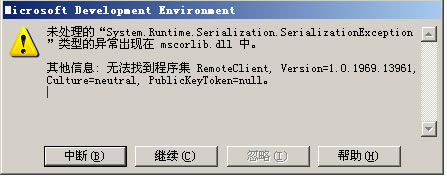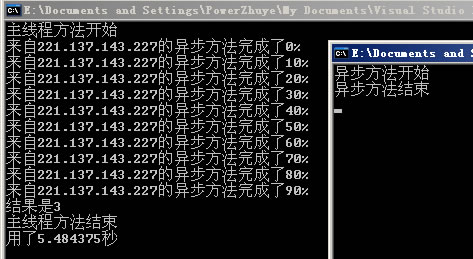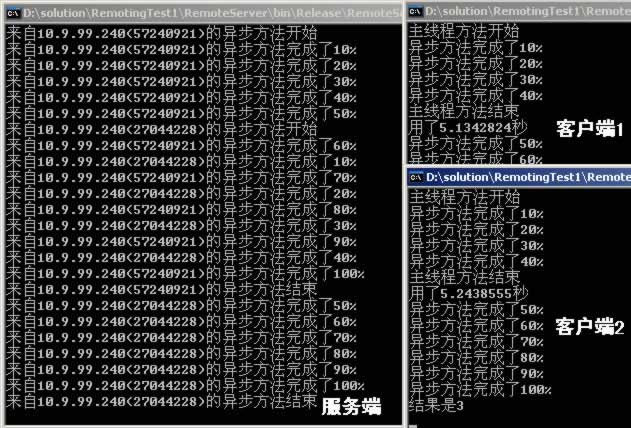周末又过去了要上班了,一大早起来继续写。
概念就不说了,具体参见msdn相关章节:
http://msdn.microsoft.com/library/CHS/cpguide/html/cpconEvents.asp
我们先来改造一下上次的程序,为上次的主线程方法添加事件,能不断的引发事件来汇报处理的进度:
为了调试方便,服务器端和客户端这次都用程序实现,下面是服务器端:
客户端为了简单一点,我去除了前面做测试的本地事件:
代码看上去不错,可是debug启动后报错:

这就是我前面提到的问题,远程不可能有本地的程序集,也无法触发本地事件。解决办法就是加一个事件中间件,继承MarshalByRefObject:
然后来修改一下客户端:
把app.MyEvent += new RemoteObject.MyObject.MyEventHandler(MyEvent);修改为
概念就不说了,具体参见msdn相关章节:
http://msdn.microsoft.com/library/CHS/cpguide/html/cpconEvents.asp
我们先来改造一下上次的程序,为上次的主线程方法添加事件,能不断的引发事件来汇报处理的进度:
public
class
MyEventArgs
{
private int _rate;
public int Rate
{
get
{
return _rate;
}
}
public MyEventArgs( int rate)
{
this ._rate = rate;
}
}
public class MyObject
{
public delegate void MyEventHandler( object sender,MyEventArgs e);
public event MyEventHandler MyEvent;
public void ALongTimeMethod( int time)
{
Console.WriteLine( " 主线程方法开始 " );
for ( int i = 0 ;i < 100 ;i ++ )
{
System.Threading.Thread.Sleep(time);
OnMyEvent( new MyEventArgs(i));
}
Console.WriteLine( " 主线程方法结束 " );
}
protected void OnMyEvent(MyEventArgs e)
{
if (MyEvent != null )
{
MyEvent( this ,e);
}
}
}
{
private int _rate;
public int Rate
{
get
{
return _rate;
}
}
public MyEventArgs( int rate)
{
this ._rate = rate;
}
}
public class MyObject
{
public delegate void MyEventHandler( object sender,MyEventArgs e);
public event MyEventHandler MyEvent;
public void ALongTimeMethod( int time)
{
Console.WriteLine( " 主线程方法开始 " );
for ( int i = 0 ;i < 100 ;i ++ )
{
System.Threading.Thread.Sleep(time);
OnMyEvent( new MyEventArgs(i));
}
Console.WriteLine( " 主线程方法结束 " );
}
protected void OnMyEvent(MyEventArgs e)
{
if (MyEvent != null )
{
MyEvent( this ,e);
}
}
}
再来为事件添加处理程序:
class
MyClient
{
[STAThread]
static void Main( string [] args)
{
DateTime dt = DateTime.Now;
MyObject obj = new MyObject();
obj.MyEvent += new MyObject.MyEventHandler(obj_MyEvent);
obj.ALongTimeMethod( 50 );
Console.WriteLine( " 用了 " + ((TimeSpan)(DateTime.Now - dt)).TotalSeconds + " 秒 " );
Console.ReadLine();
}
public static void obj_MyEvent( object sender,MyEventArgs e)
{
Console.WriteLine( " 主线程方法完成了 " + e.Rate + " % " );
}
}
{
[STAThread]
static void Main( string [] args)
{
DateTime dt = DateTime.Now;
MyObject obj = new MyObject();
obj.MyEvent += new MyObject.MyEventHandler(obj_MyEvent);
obj.ALongTimeMethod( 50 );
Console.WriteLine( " 用了 " + ((TimeSpan)(DateTime.Now - dt)).TotalSeconds + " 秒 " );
Console.ReadLine();
}
public static void obj_MyEvent( object sender,MyEventArgs e)
{
Console.WriteLine( " 主线程方法完成了 " + e.Rate + " % " );
}
}
运行程序可以看到: 
这个是本地的,远程对象的事件也这么简单吗?其实没有想象的简单,因为对象是在远程的,服务端的事件客户端怎么捕捉?应该说远程对象的事件可以分成客户端触发-》服务器应答,服务端触发-》客户端应答和客户端触发-》客户端应答,第一种就很简单了,后面2种都需要有一个中间件。下面我们来要为程对象同样来添加一个进度机制,首先来建立我们的远程对象:
[Serializable]
public class MyEventArgs:EventArgs
{
private int _rate;
private string _ip;
public int Rate
{
get
{
return _rate;
}
}
public string IP
{
get
{
return _ip;
}
}
public MyEventArgs( int rate, string ip)
{
this ._rate = rate;
this ._ip = ip;
}
}
public class MyObject:MarshalByRefObject
{
public delegate void MyEventHandler( object sender,MyEventArgs e);
public event MyEventHandler MyEvent;
public int ALongTimeMethod( int a, int b, int time, string ip)
{
Console.WriteLine( " 异步方法开始 " );
for ( int i = 0 ;i < 10 ;i ++ )
{
System.Threading.Thread.Sleep(time);
OnMyEvent( new MyEventArgs(i,ip));
}
Console.WriteLine( " 异步方法结束 " );
return a + b;
}
protected void OnMyEvent(MyEventArgs e)
{
if (MyEvent != null )
{
MyEvent( this ,e);
}
}
}
public class MyEventArgs:EventArgs
{
private int _rate;
private string _ip;
public int Rate
{
get
{
return _rate;
}
}
public string IP
{
get
{
return _ip;
}
}
public MyEventArgs( int rate, string ip)
{
this ._rate = rate;
this ._ip = ip;
}
}
public class MyObject:MarshalByRefObject
{
public delegate void MyEventHandler( object sender,MyEventArgs e);
public event MyEventHandler MyEvent;
public int ALongTimeMethod( int a, int b, int time, string ip)
{
Console.WriteLine( " 异步方法开始 " );
for ( int i = 0 ;i < 10 ;i ++ )
{
System.Threading.Thread.Sleep(time);
OnMyEvent( new MyEventArgs(i,ip));
}
Console.WriteLine( " 异步方法结束 " );
return a + b;
}
protected void OnMyEvent(MyEventArgs e)
{
if (MyEvent != null )
{
MyEvent( this ,e);
}
}
}
为了调试方便,服务器端和客户端这次都用程序实现,下面是服务器端:
using
System;
using System.Collections;
using System.Runtime.Remoting;
using System.Runtime.Remoting.Channels;
using System.Runtime.Remoting.Channels.Tcp;
using System.Runtime.Serialization.Formatters;
namespace RemoteServer
{
class MyServer
{
[STAThread]
static void Main( string [] args)
{
RemotingConfiguration.RegisterWellKnownServiceType( typeof (RemoteObject.MyObject), " RemoteObject.MyObject " ,WellKnownObjectMode.Singleton);
BinaryServerFormatterSinkProvider serverProvider = new BinaryServerFormatterSinkProvider();
BinaryClientFormatterSinkProvider clientProvider = new BinaryClientFormatterSinkProvider();
serverProvider.TypeFilterLevel = TypeFilterLevel.Full;
IDictionary props = new Hashtable();
props[ " port " ] = 9999 ;
TcpChannel channel = new TcpChannel(props,clientProvider,serverProvider);
ChannelServices.RegisterChannel(channel);
Console.ReadLine();
}
}
}
using System.Collections;
using System.Runtime.Remoting;
using System.Runtime.Remoting.Channels;
using System.Runtime.Remoting.Channels.Tcp;
using System.Runtime.Serialization.Formatters;
namespace RemoteServer
{
class MyServer
{
[STAThread]
static void Main( string [] args)
{
RemotingConfiguration.RegisterWellKnownServiceType( typeof (RemoteObject.MyObject), " RemoteObject.MyObject " ,WellKnownObjectMode.Singleton);
BinaryServerFormatterSinkProvider serverProvider = new BinaryServerFormatterSinkProvider();
BinaryClientFormatterSinkProvider clientProvider = new BinaryClientFormatterSinkProvider();
serverProvider.TypeFilterLevel = TypeFilterLevel.Full;
IDictionary props = new Hashtable();
props[ " port " ] = 9999 ;
TcpChannel channel = new TcpChannel(props,clientProvider,serverProvider);
ChannelServices.RegisterChannel(channel);
Console.ReadLine();
}
}
}
客户端为了简单一点,我去除了前面做测试的本地事件:
using
System;
using System.Net;
using System.Collections;
using System.Text;
using System.Runtime.Remoting;
using System.Runtime.Remoting.Channels;
using System.Runtime.Remoting.Channels.Tcp;
using System.Runtime.Serialization.Formatters;
class MyClient
{
private delegate int MyDelegate( int a, int b, int time, string ip);
private static MyDelegate md;
[STAThread]
static void Main( string [] args)
{
DateTime dt = DateTime.Now;
RemotingConfiguration.RegisterWellKnownClientType( typeof (RemoteObject.MyObject), " tcp://localhost:9999/RemoteObject.MyObject " );
BinaryServerFormatterSinkProvider serverProvider = new BinaryServerFormatterSinkProvider();
BinaryClientFormatterSinkProvider clientProvider = new BinaryClientFormatterSinkProvider();
serverProvider.TypeFilterLevel = TypeFilterLevel.Full;
IDictionary props = new Hashtable();
props[ " port " ] = 0 ;
TcpChannel channel = new TcpChannel(props,clientProvider,serverProvider);
ChannelServices.RegisterChannel(channel);
RemoteObject.MyObject app = new RemoteObject.MyObject();
app.MyEvent += new RemoteObject.MyObject.MyEventHandler(MyEvent);
md = new MyDelegate(app.ALongTimeMethod);
AsyncCallback ac = new AsyncCallback(MyClient.CallBack);
IPHostEntry ipHE = Dns.GetHostByName(Dns.GetHostName());
IAsyncResult Iar = md.BeginInvoke( 1 , 2 , 300 ,ipHE.AddressList[ 0 ].ToString(),ac, null );
Method();
Console.WriteLine( " 用了 " + ((TimeSpan)(DateTime.Now - dt)).TotalSeconds + " 秒 " );
ChannelServices.UnregisterChannel(channel);
Console.ReadLine();
}
public static void CallBack(IAsyncResult Iar)
{
if (Iar.IsCompleted)
{
Console.WriteLine( " 结果是 " + md.EndInvoke(Iar));
}
}
public static void MyEvent( object sender,RemoteObject.MyEventArgs e)
{
Console.WriteLine( " 来自 " + e.IP + " 的异步方法完成了 " + e.Rate * 10 + " % " );
}
public static void Method()
{
Console.WriteLine( " 主线程方法开始 " );
System.Threading.Thread.Sleep( 5000 );
Console.WriteLine( " 主线程方法结束 " );
}
}
using System.Net;
using System.Collections;
using System.Text;
using System.Runtime.Remoting;
using System.Runtime.Remoting.Channels;
using System.Runtime.Remoting.Channels.Tcp;
using System.Runtime.Serialization.Formatters;
class MyClient
{
private delegate int MyDelegate( int a, int b, int time, string ip);
private static MyDelegate md;
[STAThread]
static void Main( string [] args)
{
DateTime dt = DateTime.Now;
RemotingConfiguration.RegisterWellKnownClientType( typeof (RemoteObject.MyObject), " tcp://localhost:9999/RemoteObject.MyObject " );
BinaryServerFormatterSinkProvider serverProvider = new BinaryServerFormatterSinkProvider();
BinaryClientFormatterSinkProvider clientProvider = new BinaryClientFormatterSinkProvider();
serverProvider.TypeFilterLevel = TypeFilterLevel.Full;
IDictionary props = new Hashtable();
props[ " port " ] = 0 ;
TcpChannel channel = new TcpChannel(props,clientProvider,serverProvider);
ChannelServices.RegisterChannel(channel);
RemoteObject.MyObject app = new RemoteObject.MyObject();
app.MyEvent += new RemoteObject.MyObject.MyEventHandler(MyEvent);
md = new MyDelegate(app.ALongTimeMethod);
AsyncCallback ac = new AsyncCallback(MyClient.CallBack);
IPHostEntry ipHE = Dns.GetHostByName(Dns.GetHostName());
IAsyncResult Iar = md.BeginInvoke( 1 , 2 , 300 ,ipHE.AddressList[ 0 ].ToString(),ac, null );
Method();
Console.WriteLine( " 用了 " + ((TimeSpan)(DateTime.Now - dt)).TotalSeconds + " 秒 " );
ChannelServices.UnregisterChannel(channel);
Console.ReadLine();
}
public static void CallBack(IAsyncResult Iar)
{
if (Iar.IsCompleted)
{
Console.WriteLine( " 结果是 " + md.EndInvoke(Iar));
}
}
public static void MyEvent( object sender,RemoteObject.MyEventArgs e)
{
Console.WriteLine( " 来自 " + e.IP + " 的异步方法完成了 " + e.Rate * 10 + " % " );
}
public static void Method()
{
Console.WriteLine( " 主线程方法开始 " );
System.Threading.Thread.Sleep( 5000 );
Console.WriteLine( " 主线程方法结束 " );
}
}
代码看上去不错,可是debug启动后报错:

这就是我前面提到的问题,远程不可能有本地的程序集,也无法触发本地事件。解决办法就是加一个事件中间件,继承MarshalByRefObject:
public
class
EventClass:MarshalByRefObject
{
public void MyEvent( object sender,MyEventArgs e)
{
Console.WriteLine( " 来自 " + e.IP + " 的异步方法完成了 " + e.Rate * 10 + " % " );
}
}
{
public void MyEvent( object sender,MyEventArgs e)
{
Console.WriteLine( " 来自 " + e.IP + " 的异步方法完成了 " + e.Rate * 10 + " % " );
}
}
然后来修改一下客户端:
把app.MyEvent += new RemoteObject.MyObject.MyEventHandler(MyEvent);修改为
RemoteObject.EventClass ec
=
new
RemoteObject.EventClass();
app.MyEvent += new RemoteObject.MyObject.MyEventHandler(ec.MyEvent);
app.MyEvent += new RemoteObject.MyObject.MyEventHandler(ec.MyEvent);
删除客户端的MyEvent静态方法。
运行一下程序: 
前后两个窗口本别是服务端和客户端的,貌似达到了我们的要求,其实不然,程序有2个漏洞:
1、客户端关闭以后打开新的程序就出错,因为以前的委托链丢失,服务端程序企图触发事件出错。
2、同时打开几个客户端,客户端收到的是所有的进度信息,而不仅仅是自己的,广播性质的消息。
到了午休的时间,抓紧时间继续写,上次说有2个遗留问题:
(1)关闭一个客户端以后会影响其他的客户端事件
原因:客户端没有取消事件订阅就关闭了,触发事件的时候找不到事件订阅者
解决:遍历委托链,找到异常的对象,从委托链中卸下
(2)服务器端对客户端广播,客户端能收到其他客户端的事件处理信息
原因:使用了Singleton模式,共享远程对象
解决:因为需要远程对象有状态且不共享实例,所以只有客户端激活可以选择
修改后的服务端:
修改后的远程对象:
修改后的客户端:
(1)关闭一个客户端以后会影响其他的客户端事件
原因:客户端没有取消事件订阅就关闭了,触发事件的时候找不到事件订阅者
解决:遍历委托链,找到异常的对象,从委托链中卸下
(2)服务器端对客户端广播,客户端能收到其他客户端的事件处理信息
原因:使用了Singleton模式,共享远程对象
解决:因为需要远程对象有状态且不共享实例,所以只有客户端激活可以选择
修改后的服务端:
using
System;
using System.Collections;
using System.Runtime.Remoting;
using System.Runtime.Remoting.Channels;
using System.Runtime.Remoting.Channels.Tcp;
using System.Runtime.Serialization.Formatters;
namespace RemoteServer
{
class MyServer
{
[STAThread]
static void Main( string [] args)
{
RemotingConfiguration.ApplicationName = " RemoteObject.MyObject " ;
RemotingConfiguration.RegisterActivatedServiceType( typeof (RemoteObject.MyObject));
BinaryServerFormatterSinkProvider serverProvider = new BinaryServerFormatterSinkProvider();
BinaryClientFormatterSinkProvider clientProvider = new BinaryClientFormatterSinkProvider();
serverProvider.TypeFilterLevel = TypeFilterLevel.Full;
IDictionary props = new Hashtable();
props[ " port " ] = 8888 ;
TcpChannel channel = new TcpChannel(props,clientProvider,serverProvider);
ChannelServices.RegisterChannel(channel);
Console.ReadLine();
}
}
}
using System.Collections;
using System.Runtime.Remoting;
using System.Runtime.Remoting.Channels;
using System.Runtime.Remoting.Channels.Tcp;
using System.Runtime.Serialization.Formatters;
namespace RemoteServer
{
class MyServer
{
[STAThread]
static void Main( string [] args)
{
RemotingConfiguration.ApplicationName = " RemoteObject.MyObject " ;
RemotingConfiguration.RegisterActivatedServiceType( typeof (RemoteObject.MyObject));
BinaryServerFormatterSinkProvider serverProvider = new BinaryServerFormatterSinkProvider();
BinaryClientFormatterSinkProvider clientProvider = new BinaryClientFormatterSinkProvider();
serverProvider.TypeFilterLevel = TypeFilterLevel.Full;
IDictionary props = new Hashtable();
props[ " port " ] = 8888 ;
TcpChannel channel = new TcpChannel(props,clientProvider,serverProvider);
ChannelServices.RegisterChannel(channel);
Console.ReadLine();
}
}
}
修改后的远程对象:
using
System;
namespace RemoteObject
{
[Serializable]
public class MyEventArgs:EventArgs
{
private int _rate;
private string _ip;
public int Rate
{
get
{
return _rate;
}
}
public string IP
{
get
{
return _ip;
}
}
public MyEventArgs( int rate, string ip)
{
this ._rate = rate;
this ._ip = ip;
}
}
public class MyObject:MarshalByRefObject
{
public delegate void MyEventHandler( object sender,MyEventArgs e);
public event MyEventHandler MyEvent;
public string tmp;
public int ALongTimeMethod( int a, int b, int time, string ip)
{
Console.WriteLine( " 来自 " + ip + " 的异步方法开始 " );
for ( int i = 1 ;i <= 10 ;i ++ )
{
System.Threading.Thread.Sleep(time);
Console.WriteLine( " 来自 " + ip + " 的异步方法完成了 " + i * 10 + " % " );
OnMyEvent( new MyEventArgs(i,ip));
}
Console.WriteLine( " 来自 " + ip + " 的异步方法结束 " );
return a + b;
}
protected void OnMyEvent(MyEventArgs e)
{
if (MyEvent != null )
{
foreach (Delegate d in MyEvent.GetInvocationList())
{
try
{
((MyEventHandler)d)( this ,e);
}
catch
{
MyEvent -= (MyEventHandler)d;
}
}
}
}
}
public class EventClass:MarshalByRefObject
{
public void MyEvent( object sender,MyEventArgs e)
{
if (((MyObject)sender).tmp == e.IP)
Console.WriteLine( " 异步方法完成了 " + e.Rate * 10 + " % " );
}
}
}
namespace RemoteObject
{
[Serializable]
public class MyEventArgs:EventArgs
{
private int _rate;
private string _ip;
public int Rate
{
get
{
return _rate;
}
}
public string IP
{
get
{
return _ip;
}
}
public MyEventArgs( int rate, string ip)
{
this ._rate = rate;
this ._ip = ip;
}
}
public class MyObject:MarshalByRefObject
{
public delegate void MyEventHandler( object sender,MyEventArgs e);
public event MyEventHandler MyEvent;
public string tmp;
public int ALongTimeMethod( int a, int b, int time, string ip)
{
Console.WriteLine( " 来自 " + ip + " 的异步方法开始 " );
for ( int i = 1 ;i <= 10 ;i ++ )
{
System.Threading.Thread.Sleep(time);
Console.WriteLine( " 来自 " + ip + " 的异步方法完成了 " + i * 10 + " % " );
OnMyEvent( new MyEventArgs(i,ip));
}
Console.WriteLine( " 来自 " + ip + " 的异步方法结束 " );
return a + b;
}
protected void OnMyEvent(MyEventArgs e)
{
if (MyEvent != null )
{
foreach (Delegate d in MyEvent.GetInvocationList())
{
try
{
((MyEventHandler)d)( this ,e);
}
catch
{
MyEvent -= (MyEventHandler)d;
}
}
}
}
}
public class EventClass:MarshalByRefObject
{
public void MyEvent( object sender,MyEventArgs e)
{
if (((MyObject)sender).tmp == e.IP)
Console.WriteLine( " 异步方法完成了 " + e.Rate * 10 + " % " );
}
}
}
修改后的客户端:
using
System;
using System.Net;
using System.Collections;
using System.Text;
using System.Runtime.Remoting;
using System.Runtime.Remoting.Channels;
using System.Runtime.Remoting.Channels.Tcp;
using System.Runtime.Serialization.Formatters;
class MyClient
{
private delegate int MyDelegate( int a, int b, int time, string ip);
private static MyDelegate md;
static RemoteObject.MyObject app;
static RemoteObject.EventClass ec;
static DateTime dt;
[STAThread]
static void Main( string [] args)
{
dt = DateTime.Now;
RemotingConfiguration.RegisterActivatedClientType( typeof (RemoteObject.MyObject), " tcp://localhost:8888/RemoteObject.MyObject " );
BinaryServerFormatterSinkProvider serverProvider = new BinaryServerFormatterSinkProvider();
BinaryClientFormatterSinkProvider clientProvider = new BinaryClientFormatterSinkProvider();
serverProvider.TypeFilterLevel = TypeFilterLevel.Full;
IDictionary props = new Hashtable();
props[ " port " ] = 0 ;
TcpChannel channel = new TcpChannel(props,clientProvider,serverProvider);
ChannelServices.RegisterChannel(channel);
app = new RemoteObject.MyObject();
ec = new RemoteObject.EventClass();
app.MyEvent += new RemoteObject.MyObject.MyEventHandler(ec.MyEvent);
md = new MyDelegate(app.ALongTimeMethod);
AsyncCallback ac = new AsyncCallback(MyClient.CallBack);
IPHostEntry ipHE = Dns.GetHostByName(Dns.GetHostName());
Random rnd = new Random(System.Environment.TickCount);
string ip = ipHE.AddressList[ 0 ].ToString() + " ( " + rnd.Next( 100000000 ).ToString() + " ) " ;
app.tmp = ip;
IAsyncResult Iar = md.BeginInvoke( 1 , 2 , 500 ,ip,ac, null );
Method();
Console.WriteLine( " 用了 " + ((TimeSpan)(DateTime.Now - dt)).TotalSeconds + " 秒 " );
ChannelServices.UnregisterChannel(channel);
Console.ReadLine();
}
public static void CallBack(IAsyncResult Iar)
{
if (Iar.IsCompleted)
{
Console.WriteLine( " 结果是 " + md.EndInvoke(Iar));
app.MyEvent -= new RemoteObject.MyObject.MyEventHandler(ec.MyEvent);
}
}
public static void Method()
{
Console.WriteLine( " 主线程方法开始 " );
System.Threading.Thread.Sleep( 5000 );
Console.WriteLine( " 主线程方法结束 " );
}
}
using System.Net;
using System.Collections;
using System.Text;
using System.Runtime.Remoting;
using System.Runtime.Remoting.Channels;
using System.Runtime.Remoting.Channels.Tcp;
using System.Runtime.Serialization.Formatters;
class MyClient
{
private delegate int MyDelegate( int a, int b, int time, string ip);
private static MyDelegate md;
static RemoteObject.MyObject app;
static RemoteObject.EventClass ec;
static DateTime dt;
[STAThread]
static void Main( string [] args)
{
dt = DateTime.Now;
RemotingConfiguration.RegisterActivatedClientType( typeof (RemoteObject.MyObject), " tcp://localhost:8888/RemoteObject.MyObject " );
BinaryServerFormatterSinkProvider serverProvider = new BinaryServerFormatterSinkProvider();
BinaryClientFormatterSinkProvider clientProvider = new BinaryClientFormatterSinkProvider();
serverProvider.TypeFilterLevel = TypeFilterLevel.Full;
IDictionary props = new Hashtable();
props[ " port " ] = 0 ;
TcpChannel channel = new TcpChannel(props,clientProvider,serverProvider);
ChannelServices.RegisterChannel(channel);
app = new RemoteObject.MyObject();
ec = new RemoteObject.EventClass();
app.MyEvent += new RemoteObject.MyObject.MyEventHandler(ec.MyEvent);
md = new MyDelegate(app.ALongTimeMethod);
AsyncCallback ac = new AsyncCallback(MyClient.CallBack);
IPHostEntry ipHE = Dns.GetHostByName(Dns.GetHostName());
Random rnd = new Random(System.Environment.TickCount);
string ip = ipHE.AddressList[ 0 ].ToString() + " ( " + rnd.Next( 100000000 ).ToString() + " ) " ;
app.tmp = ip;
IAsyncResult Iar = md.BeginInvoke( 1 , 2 , 500 ,ip,ac, null );
Method();
Console.WriteLine( " 用了 " + ((TimeSpan)(DateTime.Now - dt)).TotalSeconds + " 秒 " );
ChannelServices.UnregisterChannel(channel);
Console.ReadLine();
}
public static void CallBack(IAsyncResult Iar)
{
if (Iar.IsCompleted)
{
Console.WriteLine( " 结果是 " + md.EndInvoke(Iar));
app.MyEvent -= new RemoteObject.MyObject.MyEventHandler(ec.MyEvent);
}
}
public static void Method()
{
Console.WriteLine( " 主线程方法开始 " );
System.Threading.Thread.Sleep( 5000 );
Console.WriteLine( " 主线程方法结束 " );
}
}
之所以要在ip地址后面跟上随机数,是因为可能在一个机器上会打开多个客户端,需要在这个时候能在服务器端区分多个客户端。
备注:我的所有例子都是在客户端和服务器端部署远程对象的,其实这个做法不是很好,我们应该仅仅把接口部署在两地,远程对象仅仅部署在服务器端即可。
TrackBack:http://www.cnblogs.com/lovecherry/archive/2005/05/23/160954.html
转载于:https://www.cnblogs.com/hdjjun/archive/2008/06/17/1223955.html